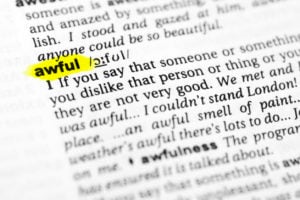I love rules. I love following rules and making them. I am a rule maker—not a rule breaker, especially in title capitalization. If we ever play a board game together, yes, I will almost certainly whip out the rules sheet at some point during the game.
Rules are the explicit instructions for how to be successful in any venture. Clear and unambiguous rules are what make chess and Ancient Greek so much fun. Being successful in either chess or Ancient Greek means following a strict set of guidelines that are generally unbending. And even if the sum of all the rules is complex (as with Ancient Greek), the rules themselves rely little on human interpretation.

The Rules of Start-Case Capitalization
It’s because of my appreciation for clarity and unambiguous rules that I have firmly settled on a preference for title capitalization: start-case capitalization. With start-case capitalization, the first letter of every word in a title is capitalized, regardless of its function. It doesn’t matter if that word is a single letter, a conjunction, a proper noun, or a verb; if it’s in a title, it should be capitalized.
The Dark History Of Children’s Nursery Rhymes
The Old Man And The Sea
The Bridge Of San Luis Rey
The One Thing You Need To Know About Hamsters
AP-Style Capitalization
April’s position that AP-style capitalization is best, is, at its heart, a shared appreciation of simplicity in rules. But I wholeheartedly disagree with using AP Style for title capitalization. When looked at next to start-case capitalization, AP/news-style headlines get messy.
First, what exactly are the rules of AP-style capitalization? That’s also messy. It’s different if it’s a newspaper title, a book, or a short story. Already there are plenty of gray areas. As a lover of rules, gray areas are a nightmare.
According to Brandeis University, the AP Stylebook says that composition titles (books, works of art, song titles, magazine titles, etc.) should “capitalize the principal words, including prepositions and conjunctions of four or more letters”. There’s a further caveat, which instructs to capitalize “an article or words of fewer than four letters if it is the first or last word in a title”.
Oh, OK. That’s a lot to remember. And leaves a lot of room for error.
And most problematic of all is that now we are dealing with subjective human interpretation. What constitutes a principal word? Could you make a case for titling Fitzgerald’s novel The Great Gatsby?
Is Gatsby great or is he the Great Gatsby? How principle is “great”? All I know is that we shouldn’t have to rely on someone else’s interpretation of Fitzgerald’s meaning, or the definition of principal, for proper title capitalization.
AP Stylebook
It’s true that the AP Stylebook’s recommendation for headline capitalization is less ambiguous and simpler (only first words and proper nouns are capitalized), but that is not without its own host of problems. First, what exactly is a headline and what exactly is a title? The line between the two isn’t definitive.
For most readers, headlines introduce the gist of the content below it. With AP-style capitalization for headlines, the headlines look less like flashy introductions to content, and more confusingly like lead sentences. In AP/news-style capitalization, this headline just looks like a creepy sentence:
The dark history of children’s nursery rhymes
Furthermore, the AP Stylebook specifically offers the start-case capitalization method for online publication. Why does a headline’s capitalization matter if the content is online or in print?
See? AP/news-style headlines should be avoided.
The Takeaway from Title Capitalization
The only real objection to start-case capitalization may be that some find the aesthetic of capitalizing conjunctions garishly unappealing. But rather than throwing out a very useful rule, I’d encourage all of us to use fewer prepositions in our titles and headlines—which may be a good practice regardless of capitalization.
Start-case capitalization simplifies the whole matter. It’s The Great Gatsby, regardless of how you slice it. While it may not be aesthetically pleasing to some, start-case capitalization relies on clarity and objective rules and makes the title capitalization a neat and tidy affair.



